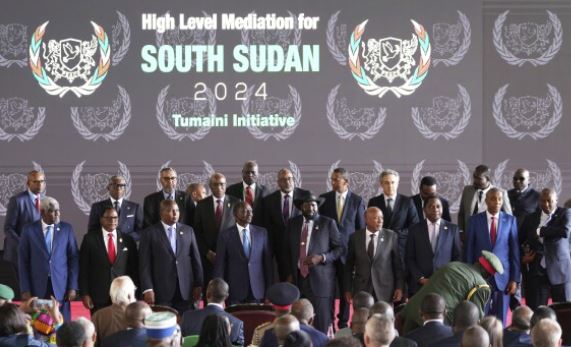BY MALUAL BOL KIIR
As South Sudan nears the end of 2024, the hopes of millions for a peaceful Christmas have been overshadowed by the adjournment of the Tumaini peace process. For a nation that has endured decades of war, political instability, and economic hardship, this setback raises pressing questions: Can South Sudan achieve lasting peace in 2025, or will unresolved issues continue to undermine the country’s progress?
The stalemate and its implications
The Tumaini process was intended to be a platform to resolve critical political and security challenges in South Sudan. However, key issues such as the unification of armed forces, constitutional reforms, and the establishment of a framework for equitable governance remain unresolved. The adjournment of the process reflects entrenched political divisions and growing mistrust between leaders, which continues to hinder the implementation of meaningful solutions.
While previous agreements, including the Revitalized Agreement on the Resolution of Conflict in South Sudan (R-ARCSS), showed initial signs of progress, delays in implementation have eroded public confidence. This most recent impasse has left citizens disillusioned and increasingly concerned about the future trajectory of their country.
The human cost of delayed peace
The ongoing absence of peace in South Sudan is taking a devastating toll on ordinary citizens. According to recent reports, over 9 million South Sudanese—nearly 75 percent of the population—are reliant on humanitarian aid to survive. Prolonged insecurity has exacerbated displacement, poverty, and the collapse of essential services.
In rural areas, violence fueled by cattle raiding, communal conflicts, and armed skirmishes continues to destabilize communities. For refugees and internally displaced persons (IDPs), the dream of returning home remains distant, as many spend yet another year separated from their families and livelihoods.
The adjournment of the Tumaini process has further diminished hope, leaving many to question whether 2025 will bring tangible progress or simply prolong the cycle of political stagnation and suffering.
Is there still hope for peace in 2025?
Despite the setbacks, there are still opportunities for meaningful progress in the coming year. Achieving sustainable peace will require bold leadership and a renewed commitment to dialogue, compromise, and action. South Sudan’s leaders must rise above personal political agendas and prioritize the collective interests of their people.
Civil society, youth groups, and women’s organizations continue to play an essential role in advocating for peace, justice, and accountability. Their efforts highlight the urgent need for inclusive decision-making and grassroots involvement in the peace process.
Equally critical is the role of regional and international partners, including the Intergovernmental Authority on Development (IGAD), the African Union (AU), and the United Nations. These organizations must continue to exert consistent pressure on South Sudan’s leaders to ensure that their commitments are honored and that tangible progress is made toward peace.
A call for leadership and accountability
Although the adjournment of Tumaini may have delayed immediate solutions, the resilience of South Sudan’s people remains a source of hope. For the country to move forward, leaders must demonstrate political will and moral courage. Delivering peace is not just a political imperative—it is a moral responsibility to future generations who deserve to grow up in a nation defined by stability, opportunity, and unity.
As South Sudan enters 2025, the call for peace grows louder. The time for delays and excuses has passed. Now is the moment for decisive action, cooperation, and a shared vision for a peaceful South Sudan.
Conclusion
While the challenges ahead are significant, the prospect of peace is still within reach. South Sudan’s leaders, with the support of citizens and international partners, have the power to make 2025 a turning point in the nation’s history.
Peace remains the most precious gift South Sudan can offer its people—a gift that must be realized through trust, compromise, and collective action.
Malual Bol Kiir, aka “The Unity Catalyst,” is a South Sudanese peace and human rights advocate, founder of the African Youth Action Network (AYAN), and a global advocate for youth empowerment, refugee rights, and sustainable peace. He can be reached via malualbk2005@gmail.com.
The views expressed in ‘opinion’ articles published by Radio Tamazuj are solely those of the writer. The veracity of any claims made is the responsibility of the author, not Radio Tamazuj.




